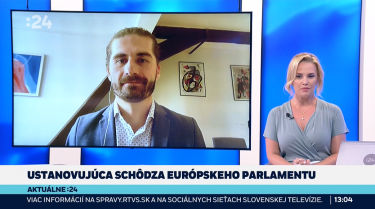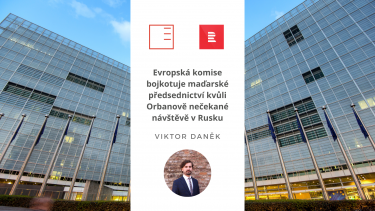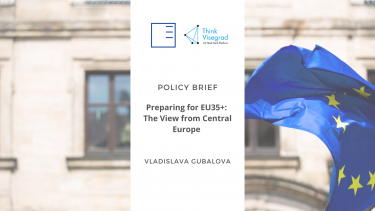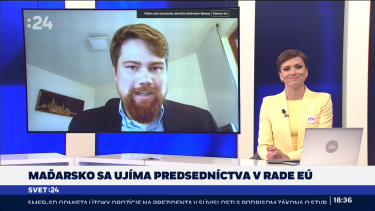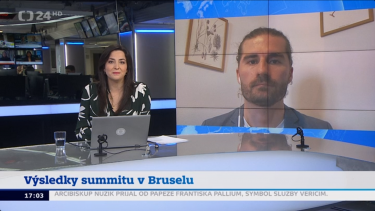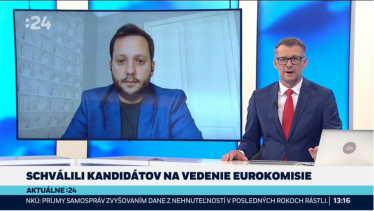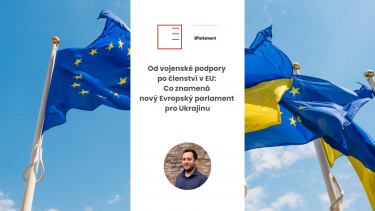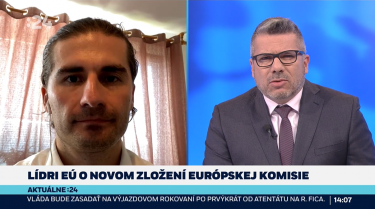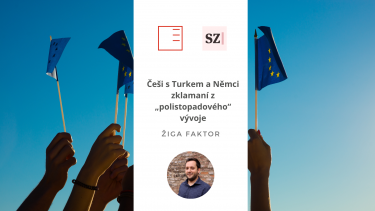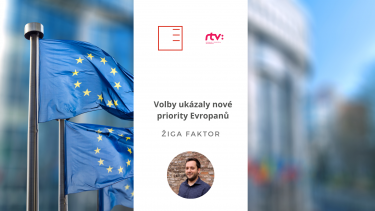STVR | Constituent meeting of the European Parliament
Members of the European Parliament continue to assign themselves to various committees, familiarize with the agendas assigned to them, and have already started working. At the constituent meeting, the first discussion was on a new legislative proposal concerning Ukraine, during which MEPs expressed continued support for the country. Viktor Daněk, Deputy Director of the EUROPEUM Institute, commented for Slovakian STVR.
Show moreČRo | The European Commission boycotts the Hungarian presidency due to Orban's unexpected visit to Russia
The European Commission has announced that, in light of developments since the beginning of the Hungarian presidency of the Council of the European Union, it plans to boycott informal ministerial meetings and send only senior officials instead of commissioners. Viktor Orbán has come under criticism for his recent trip to Russia, which he described as a peace mission aimed at ending the war in Ukraine and which he did not consult with the leaders of other EU states. This move comments Viktor Daněk, deputy director of EUROPEUM Institute for Czech Radio.
Show morePolicy Brief | Preparing for EU35+: The View from Central Europe
Despite the historical support of EU enlargement policy by the Visegrad Four (V4), these Central European states are now faced with the challenge of reconciling their stances with the new realities of the process. As Ukraine and Moldova opened their accession negotiations, the EU seems to be torn on the questions associated with the future enlargement(s) - institutional reforms and changes within the EU budget. Transitioning from economic beneficiaries to potential contributors, the V4 states must evaluate the potential political and economic impacts of new members on both the EU and their domestic levels. Writes and proposes recommendations Vladislava Gubalova from GLOBSEC.
Show moreRTVS | Hungary takes over the Presidency of the EU
From this day Hungary holds the Presidency of the EU. It takes over the Presidency from Belgium and will set the European agenda until the end of the year. The Hungarian Presidency says it wants to find real solutions to real problems. But some analysts fear that important issues, including support for Ukraine, could take a back seat. Martin Vokálek, executive director of EUROPEUM Institute, comments for RTVS.
Show more
ČT24 | Who will get the top jobs in the European Union?
EU leaders nominate Ursula von der Leyen to lead the European Commission again. Estonian Prime Minister Kaja Kallas, known for her support for Ukraine, is to lead EU's foreign policy. Both women have yet to be confirmed in top jobs by the European Parliament. In addition to the majority, support may also have to be sought from the conservatives or the Greens. Viktor Daněk, deputy director of EUROPEUM Institute, comments for ČT24.
Show moreRTVS | EU and Ukraine have concluded a comprehensive security agreement in Brussels
The European Union and Ukraine concluded a comprehensive security agreement in Brussels. This builds upon the EU's longstanding support for Ukraine. What did the politicians agree upon? What is new in the new treaty? Žiga Faktor, Deputy Director and Head of the Brussels Office at the EUROPEUM Institute, commented for the Slovak RTVS.
Show more
The Parliament Magazine | From military support to EU membership: What the new European Parliament means for Ukraine
The results of the European elections are favorable for Ukraine; the center-right European People's Party (EPP) won the most seats, thereby strengthening the position of European Commission President Ursula von der Leyen, a strong supporter of Ukraine. On the other hand, while some groups to the right of the EPP also had successes, their support for Ukraine is mixed. Žiga Faktor, Deputy Director and Head of the Brussels Office of EUROPEUM Institute, commented the situation for The Parliament magazine.
Show more
RTVS | EU leaders discussed the new European Commission
On Monday, June 17, an informal meeting of the 27 member states of the European Union took place. Their leaders discussed the nominations of members for the new European Commission. Ursula von der Leyen will also have to compete for her position as President of the European Commission again. Viktor Daněk, Deputy Director of EUROPEUM Institute, discussed her chances on the Slovak television RTVS.
Show moreSeznam Zprávy | Czechs with MEP Turek and Germans disappointed with the "post-Soviet" development
The European elections ended with the success of far-right parties. Nevertheless, they will probably not have a decisive influence in the European Parliament and there will probably be no significant shift in the European agenda. What will the new MEPs do about the Green Deal or further support for Ukraine? Žiga Faktor, deputy director and head of EUROPEUM's Brussels office, comments for the 5:59 podcast of Seznam Zprávy.
Show more
RTVS | Elections show Europeans' new priorities
After the European Parliament elections, the two largest factions retained their positions. However, far right parties has made gains at the expense of the Liberals and Greens. It was significant in France, Germany, Austria and other Member States. Why more and more young people vote for them? Will the right-wing groups in the EP join forces? And how can they influence migration policy, support for Ukraine or the Green Deal? For RTVS programme Z prvej ruky comments Žiga Faktor, deputy director and head of the EUROPEUM Institute's Brussels office.
Show more
Staroměstské náměstí 4/1
Prague 1 - Staré Město
110 00
tel.: +420 212 246 552
email: europeum@europeum.org
https://www.europeum.org
